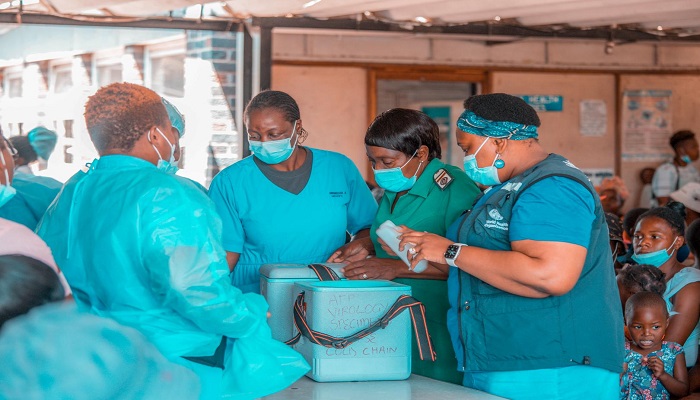IN a move that is set to catapult Zimbabwe’s vaccination coverage to dizzy heights, the country has already started implementing an integrated vaccination drive in communities mainly prioritizing Human papillomavirus vaccines (HPV), COVID-19, Tetanus and Diphtheria (DT).
By Michael Gwarisa
Zimbabwe’s integrated vaccination drive is in line with the “The Big Catch-up”, a targeted global effort to boost vaccination among children following declines driven by the COVID-19 pandemic. The campaign is being led by the World Health Organization (WHO), UNICEF, Gavi, the Vaccine Alliance and the Bill & Melinda Gates Foundation, along with Immunization Agenda 2030 and many other global and national health partners.
Speaking during a Ministry of Health and Child Care, UNICEF and WHO media briefing on immunization, Mr Norman Dzirambi, the Health Promotion Manager-EPI in the Ministry of Health and Child Care said intensive vaccination guided by scientific data has already commenced in communities.
We have also been following our statistics closely and in the “Big Catch-Up” that we are promoting this African Vaccination Week, our provinces are currently ramping up immunization and the main vaccines that they have been directed to focus on include COVID-19 vaccines for those who are yet to be vaccinated and the HPV although this time they are doing it in the communities,” said Mr Dzirambi.
He added that they will be taking the HPV vaccination drive into schools once schools reopen in a few days’ time.
“For the next three months or so, our district and health facilities are ramping up vaccination with special focus on COVID-19, HPV and also a special vaccine called TD which we give at five years and also at 10 years. Those are school based tools and these are the main focus of the current intensification of the vaccination.”
According to a United Nations Children’s Fund (UNICEF) State of the World’s Children 2023 regional brief for Eastern and Southern Africa, HPV vaccination in Zimbabwe declined by 24 percent, from 91 percent in 2019 to 67 percent in 2021. Data shows that around 4 million women aged 15 years and older are at risk of developing cervical cancer in Zimbabwe.
Meggie Gabida, Health Officer at UNICEF said, “…the Ministry of Health has already probably started convergence programing to say as we are talking about integration, we need to ensure that all these services are actually integrated and delivered within the primary healthcare platform so that we address all these multiple issues that are affecting people, children etc in terms of accessing immunisation.”
Meanwhile, Dr Maxwell Rupfutse, a Public Heal Officer at WHO said Zimbabwe had successfully integrated COVID-19 into Routine Immunisation (RI) and this would help speed up the Catch- Up process for other vaccinations lagging behind.
“When we are promoting vaccines, the key word is integration. During this Catch Up week, we are promoting all vaccines. Childhood vaccines, young adult vaccines, adolescents, the elderly including COVID-19. As you are aware, COVID-19 is now fully integrated into routine immunisation,” said Rupfutsa.
He added that vaccination had indeed taken a knock due to distractions caused by COVID-19 as a disease and also response actions, as resources and attention was diverted from routine health services towards responding to COVID-19.
“Currently we are working on recovery strategies and one of the interventions and what we have been pushing as WHO, working with partners is the development of a generic immunisation Catch Up schedule which countries can adopt to ensure that the children who had missed vaccination since 2020-2021 and 2022 can still catch up on those vaccines that they missed.”
In terms of establishing a catch–up vaccination policy and schedule, WHO recommends every country to have a clear catch–up vaccination policy and catch–up schedule designed in line with the national immunization schedule. The catch–up policy should provide clarity to health workers on: the importance of providing vaccinations for those who have missed one or more doses, within the national immunization schedule, how to determine eligibility including permissible age ranges, correct recording and reporting of delayed doses, and leverage every health contact as an opportunity to check vaccination history and catch up on vaccinations as appropriate.
In Zimbabwe, the vaccination coverage rate is currently at 90% and is in line with the WHO recommended target. However, several districts nationwide are still performing below target, posing a risk of outbreaks. Regrettably, those unvaccinated, mainly children, are prone to preventable, life-threatening diseases like measles.




